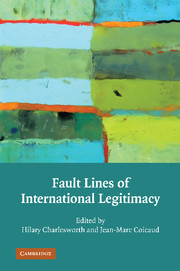Book contents
- Frontmatter
- Contents
- Acknowledgments
- Contributors
- Introduction
- PART I FROM THE HISTORY AND STRUCTURE OF INTERNATIONAL LEGITIMACY TO FAULT LINES IN CONTEMPORARY INTERNATIONAL POLITICS
- PART II THE UN SECURITY COUNCIL: EXPRESSION, VENUE, AND PROMOTER OF INTERNATIONAL LEGITIMACY?
- 6 Legal Deliberation and Argumentation in International Decision Making
- 7 The UN Security Council, Regional Arrangements, and Peacekeeping Operations
- 8 The Security Council's Alliance of Gender Legitimacy: The Symbolic Capital of Resolution 1325
- PART III LEGITIMACY OF INTERNATIONAL INTERVENTIONS AND HIERARCHY OF INTERNATIONAL RIGHTS
- PART IV IN SEARCH OF NEW FORMS OF INTERNATIONAL LEGITIMACY: BETWEEN POWER AND PRINCIPLES
- Conclusion: The Legitimacies of International Law
- Index
- References
7 - The UN Security Council, Regional Arrangements, and Peacekeeping Operations
Published online by Cambridge University Press: 06 April 2010
- Frontmatter
- Contents
- Acknowledgments
- Contributors
- Introduction
- PART I FROM THE HISTORY AND STRUCTURE OF INTERNATIONAL LEGITIMACY TO FAULT LINES IN CONTEMPORARY INTERNATIONAL POLITICS
- PART II THE UN SECURITY COUNCIL: EXPRESSION, VENUE, AND PROMOTER OF INTERNATIONAL LEGITIMACY?
- 6 Legal Deliberation and Argumentation in International Decision Making
- 7 The UN Security Council, Regional Arrangements, and Peacekeeping Operations
- 8 The Security Council's Alliance of Gender Legitimacy: The Symbolic Capital of Resolution 1325
- PART III LEGITIMACY OF INTERNATIONAL INTERVENTIONS AND HIERARCHY OF INTERNATIONAL RIGHTS
- PART IV IN SEARCH OF NEW FORMS OF INTERNATIONAL LEGITIMACY: BETWEEN POWER AND PRINCIPLES
- Conclusion: The Legitimacies of International Law
- Index
- References
Summary
Since the end of the Cold War, there has been an escalation of demands for United Nations (UN) intervention, mostly in situations of convoluted internal conflict that require complex and novel peacekeeping operations. Such internal conflicts are not limited to their boundaries but also affect entire regions through the displacement of persons as well as the flow of arms and resources. This generally requires both a regional and an international response. The international legitimacy of a UN peacekeeping operation is usually derived from obtaining a mandate from the UN Security Council. The uniquely broad representation of member states that contribute personnel and funding to UN operations strengthens this international legitimacy. So, too, does the fact that UN peacekeeping operations are directed by the UN Secretary-General, an impartial and well-respected international figure who is committed to upholding the principles and purposes of the UN Charter.
Since 1989, the UN has established more than thirty new peacekeeping operations, which contrasts with the fifteen instituted in the previous forty-one years. These growing commitments have stretched to the limit the capacity of the UN for effective response. The surge in UN peacekeeping activity has come at a cost. Few current UN peacekeeping missions enjoy a full degree of support and attention from member states and the UN, particularly in terms of reflection and review of strategy, policy, and effective public communications.
- Type
- Chapter
- Information
- Fault Lines of International Legitimacy , pp. 204 - 238Publisher: Cambridge University PressPrint publication year: 2010



